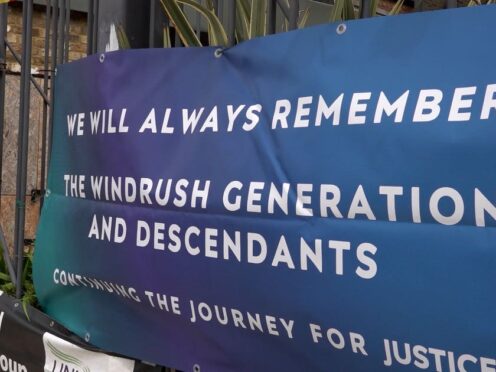The decision to drop recommendations made by an independent review into the Windrush scandal was discriminatory and another example of broken promises made to that generation, the High Court has been told.
Windrush victim Trevor Donald, 68, is bringing a legal claim against the Home Office alleging unlawful discrimination in the decision not to proceed with all of the recommendations made to the Government by a review launched in the wake of the scandal.
Solicitor Wendy Williams published her Windrush Lessons Learned Review in 2020 and all 30 recommendations were originally accepted by then-home secretary Priti Patel.
The Windrush scandal – which campaigners have since said should be known as the Home Office scandal – erupted in 2018 when British citizens, mostly from the Caribbean, were wrongly detained, deported or threatened with deportation despite having the right to live in Britain.
Many lost homes and jobs, and were denied access to healthcare and benefits.
Mr Donald, who was born in Jamaica in 1955, arrived in the UK in 1967 and lived here for the next 43 years.
Having visited Jamaica in 2010, he was refused entry when he attempted to return to the UK and at that point, his lawyers state, he became a Windrush victim.
He was eventually allowed to re-enter the UK following the emergence of the scandal in 2018 and was recognised as having indefinite leave to remain, before being granted British citizenship in January 2022.
Although all 30 recommendations were initially accepted by the Home Office, in January 2023 it was confirmed that Suella Braverman, who was in post as home secretary by that stage, had dropped three.
These were a commitment to establish a migrants’ commissioner, to increase the powers of the independent chief inspector of borders and immigration, and to hold reconciliation events.
Phillippa Kaufmann KC, for Mr Donald, said: “The decision not to proceed with Recommendations 3, 9 and 10 amounts to unlawful discrimination contrary to the claimant’s rights under Article 14 of the ECHR (European Convention on Human Rights) read with Article 8.”
The claim is being supported by the Black Equity Organisation (BEO) and trade union Unison.
Nicola Braganza KC, for the BEO, argued that the Home Office “directly discriminated against Mr Donald and other Windrush and Black and Asian communities”.
She said in written submissions: “The abandonment of the recommendations, designed to redress the historic mistreatment of the Windrush generation, is another example of the broken promises that particularly the Windrush cohort has faced, and that white British citizens have not and would not be subjected to.”
Lawyers for the Home Office stated that the review’s recommendations “were not legally binding and there was no obligation on His Majesty’s Government to implement the recommendations, whether in a particular format or at all”.
In written arguments, Edward Brown KC, for the department, continued: “The defendant’s position is that both the old and the new policy were lawful. The rights and wrongs of both policies involve assessments and judgments regarding quintessentially political issues.”
Mr Brown later said that in terms of discrimination, “the public interest justifying the policy is sufficient and/or reasonable to justify differential treatment if made out”.
The hearing before Mrs Justice Heather Williams is due to conclude on Wednesday with a decision expected in writing at a later date.
